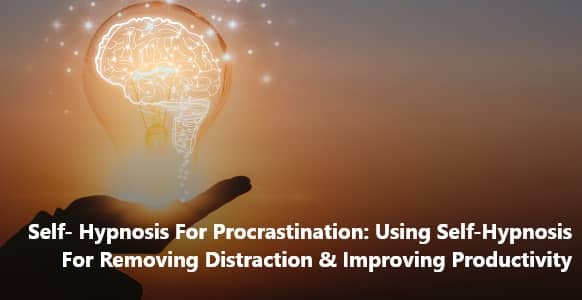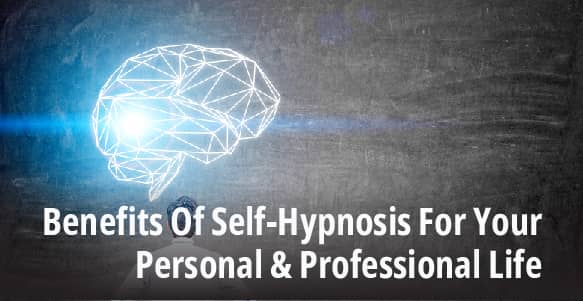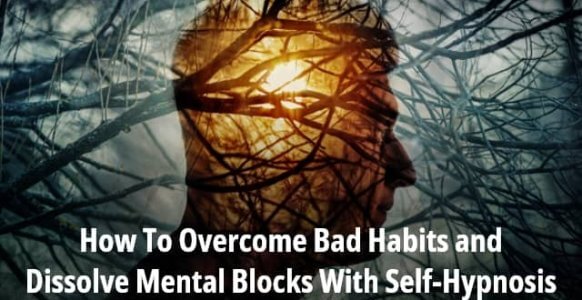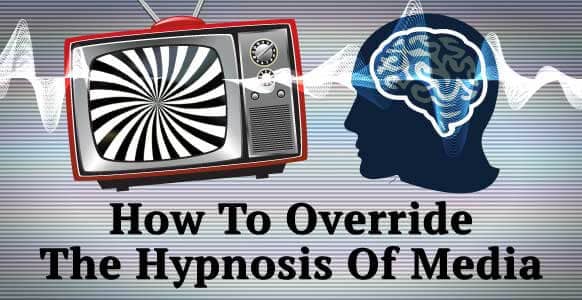
There’s an anonymous quote that says: tomorrow is often the busiest day of the week.
If you’re a procrastinator, then that quote will resonate with you.
But is procrastination really as bad as they say? It depends.
The more extreme your procrastination is, the more seriously it can affect you.
It can lead to limiting beliefs, cause you to miss golden opportunities, sabotage your goals, damage your career, adversely affect your health and wreck your relationships.
That’s why self-hypnosis for procrastination could be your new best friend.
It tackles the underlying causes of procrastination at their source and gives you the tools you need to overcome them for good.
Just like stress, the effects of procrastination are not immediately evident. Let them build up, however, and they can spiral out of control.
In simple terms, procrastination leads to putting things off, which then results in not getting things done. But it can also lead to more harmful consequences.
Like a lack of self-esteem. Or an inability to make decisions.
Ultimately it can ruin your reputation, and when all these things are taken together, your mental health is likely to suffer too.
Fortunately, self-hypnosis offers one of the easiest and safest ways to deal with it.
The process lets you communicate with your unconscious mind so you can tap into your own inner resources.
That gives you the power to change the way you think by using simple positive suggestions, making it possible to:
- Increase your self-confidence
- Set reasonable and achievable goals
- Boost your creativity
- Improve your productivity
It’s a straightforward technique that anyone can learn and that you can practice anywhere and at any time. It normally only takes about 15 minutes.
Before exploring self-hypnosis in more depth, let’s find out exactly what procrastination is and where it comes from.
>> If you’re interested in hypnotherapy or want to improve your practice, check out our live and online hypnosis training events.
Want to know more about hypnotherapy, but not sure what certification program is the right choice for you? Book a DISCOVERY CALL today to learn more about Hypnosis Training Academy’s hypnotherapy programs.
Understanding Procrastination & Its Main Causes
Procrastination refers to “delaying or postponing something” even though you realize there might be “negative consequences for doing so.”
The term has Latin roots, coming from the prefix pro- meaning forward and crastinus meaning tomorrow.
It’s a common trait that can affect anyone, particularly when the task being avoided is routine, dull, unfulfilling or monotonous.
In some cases repeated procrastination can lead to frustration, depression, feelings of guilt and inadequacy.
Some of the more traditional methods for dealing with procrastination include the following:
- Setting specific and achievable goals
- Understanding why you procrastinate
- Creating a plan of action
- Implementing your action plan
You could simply write each of these points down on paper and work through them one at a time.
But if procrastination is a serious and overwhelming problem for you, you’re more likely to put off doing that as well.
Other advice suggests kicking things off by taking one very small and manageable step. This could involve working for a short amount of time, say for two or three minutes.
The idea is to give yourself something that’s easily achievable, that doesn’t take too long and that you won’t be likely to get bored with.
That’s all well and good, but it doesn’t do anything to address the underlying problem. For that, you need self-hypnosis for procrastination.
What Is Self-Hypnosis & How Does It Work?
Self-hypnosis involves putting yourself into a hypnotic trance. But that shouldn’t scare or alarm you.
You go into a hypnotic trance all the time, such as when you get caught up in a really good movie. Or when you lose yourself in a gripping book.
Or when you’re absorbed in a favorite hobby and you’re so focused on what you’re doing that you’re not aware of anything else around you and time seems to simply fly by.
That’s what self-hypnosis is like. It’s a way to focus your attention inward so you can make changes to the way you think and the way you behave.
It works by letting you get in touch with your unconscious mind, the place where your memories, feelings, creativity, imagination and experiences are stored.
You can begin by closing your eyes and relaxing, concentrating on your breathing as you gradually shut out the conscious world.
Then you can tap into your own innate abilities that will enable you to learn new skills, develop greater confidence, set and reach specific goals, and achieve practically anything you set your mind to.
And that includes conquering procrastination. But how exactly might you go about it?
Self-Hypnosis As A Tool To Overcome Procrastination
Procrastination is essentially just a bad habit. And habits are formed when you repeat the same pattern over and over again.
Many of these patterns are formed in your mind, which is why they can be so difficult to interrupt and change.
These patterns are formed and reinforced by everything you’ve ever done or thought about, your memories and all your experiences, both positive and negative.
And science reveals exactly how strong and persistent these beliefs can be, even when they no longer serve you.
A 2012 study showed how hypnosis helped 60 subjects suffering from anxiety disorder to overcome procrastination.
Two earlier studies from the 1960s and 1970s helped college students reduce procrastination in one group, while another was able to increase their focus and boost their reading speed by up to 25%.
In another study a group was asked to distinguish between two types of wine, a basic wine and a very expensive wine. Unknown to them, both glasses contained exactly the same wine.
But because they believed that one wine was better than the other, they gave it higher marks.
That’s the power of suggestion, and the reason why self-hypnosis can be used to help you overcome procrastination.
When you’re in a hypnotic trance, you’re deeply relaxed, and your mind is open to suggestions. That’s because you’re able to block out any distractions from the outside world and let the suggestions take hold.
You can give yourself positive suggestions during a self-hypnosis session just by stating whatever it is you want to achieve. Here are a few examples:
“I am able to complete tasks on time.”
“I can focus on what needs to be done.”
“I am a confident and productive person.”
“It feels great getting tasks completed.”
Here’s another way to tackle procrastination using self-hypnosis, this time by accessing your own internal resources.
- Find somewhere quiet where you won’t be disturbed
- Close your eyes and focus on your breathing
- Think about the goal you want to achieve, which in this case is overcoming procrastination
- Remember a time in the past before procrastination became a problem for you
- Remind yourself about how good you felt back then when you got things done and were more productive
- See yourself feeling that same positive energy in the future
- Open your eyes and return to the present
The Connection Between Self-Hypnosis & Productivity
It’s true that procrastination isn’t the end of the world, but it can cause problems and make it harder to succeed. Where it perhaps matters most is in the area of productivity.
As explained above, self-hypnosis is an ideal tool for changing the way you think and behave, and productivity is of course a behavior.
What things influence your behavior?
- The way you feel
- Your confidence levels
- Your skills
- Your stress levels
- Your mental and physical health
If you’re in constant pain, for example, then you won’t be too keen to tackle any task. Likewise, if you don’t feel that you have the necessary skills to complete a project, then you’re not going to want to attempt it in the first place.
Self-hypnosis can help you deal with any issue or problem standing in your way. You can use it to:
- Boost your confidence levels
- Learn new skills
- Manage or eliminate pain
- Enjoy deep relaxation that lets you let go of excess stress
- Start feeling good about yourself again
And when you feel good, and you feel confident, knowing you’ve got the skills you need, there’ll be absolutely nothing holding you back.
You’ll have no reason to procrastinate and your productivity levels will be bound to increase dramatically.
Strategies For Using Self-Hypnosis To Improve Productivity
Your self-hypnosis sessions will likely be made up of three sections: the induction, the suggestion phase and the return to full wakefulness.
Once you get the hang of the process, you can use the suggestion phase to try out other things. Here are a few potential ideas for boosting your productivity.
1. Mental Rehearsal
This refers to mentally rehearsing something that you want to happen. In other words, imagine yourself doing it or experiencing it. It could be getting every piece of work done ahead of time, or solving a particular production problem. Try to sense how it will feel when you achieve it and bring that feeling forward into your next project.
2. Physical Rehearsal
This refers to rehearsing an actual skill in your mind, such as learning a new procedure or giving a presentation. Try to see yourself doing whatever it is perfectly to increase the chances of doing it perfectly in the future. This is a great way to remove mental blocks and to develop that all-important muscle memory.
3. Emotional Resourcing
This refers to the emotions you need in order to acquire what you want to have or get. You can do this one step at a time, by reminding yourself every day exactly how you’ll feel when you get it. Or it can be done in terms of the ultimate outcome, by telling yourself that you’re already happy without having that extra thing in your life, meaning you have all the resources you need to be able to acquire it.
Benefits Of Self-Hypnosis For Your Personal & Professional Life
There are so many advantages to be gained from using self-hypnosis that it would take another complete article to list and explain them all.
Instead, here are several benefits relating to various areas of your personal and professional life.
- Benefits for your physical health – this includes managing your weight, fighting addictions, coping with pain, boosting your immune system and overcoming illness
- Benefits for your mental health – this includes eliminating stress and anxiety, increasing your creativity, boosting your confidence and raising your self-esteem
- Benefits for your career – this includes clearly defining your goals, improving your productivity, helping you work more efficiently, thinking outside the box and performing at your peak more often
- Benefits for your personal success – this includes empowerment, giving yourself permission to make mistakes, increasing your concentration, developing new helpful habits, boosting your willpower and having the determination to succeed
Self-hypnosis can be useful in your daily life as well. Use it whenever you need to enjoy a bit of peace and quiet, to relax and get rid of any built-up stress.
You can also use the power of hypnosis to remind yourself about a particular goal you’re trying to achieve. All you need is an appropriate space and a few minutes to practice the technique.
The other big advantage offered by self-hypnosis is the fact that you can do it on your own, anytime and anywhere. That can be particularly helpful if you’re trying to motivate yourself to overcome procrastination or to improve your productivity.
Conclusion & Key Takeaways
Procrastination can be a serious problem that causes you to miss golden opportunities and that can sabotage your goals and career.
Fortunately, self-hypnosis for procrastination tackles the underlying causes of procrastination so you can overcome them at the source.
The technique makes it possible for you to change the way you think, which helps to boost your confidence, enhance your creativity and improve your productivity.
It works by letting you communicate with your unconscious mind so you can tap into and make use of your own inner resources.
Traditional methods of dealing with procrastination include setting goals and following a specific action plan. While these methods are valuable in their own right, they do little to address the underlying issues.
With self-hypnosis, however, you are able to do so much more, such as learning new skills, setting realistic goals, gaining greater confidence and achieving whatever you set your mind to.
Studies prove that hypnosis and the power of suggestion can be used to help people overcome procrastination.
Other options during the suggestion phase of a self-hypnosis session include mental rehearsal, physical rehearsal and emotional resourcing.
Self-hypnosis is an ideal tool for changing the way you think and behave, and since procrastination is a behavior, changing it could be a lot easier than you ever thought possible.
No matter who you are or what you do, self-hypnosis has far-reaching benefits that can affect they way you work, the way you play and the way you manage your relationships.
If procrastination is a problem for you or someone you know, self-hypnosis could be just what you’ve been looking for.
>> If you’re interested in hypnotherapy or want to improve your practice, check out our live and online hypnosis training events.
Want to know more about hypnotherapy, but not sure what certification program is the right choice for you? Book a DISCOVERY CALL today to learn more about Hypnosis Training Academy’s hypnotherapy programs.












![[ADVANCED GUIDE] How To Master Hypnotic Regression Therapy - Part I: Essential Principles To Profoundly Transform Your Subject’s Emotional Trauma [ADVANCED GUIDE] How To Master Hypnotic Regression Therapy - Part I: Essential Principles To Profoundly Transform Your Subject’s Emotional Trauma](https://hypnosistrainingacademy.com/wp-content/uploads/2016/09/hypnotic-regression-therapy-essential-principles.jpg)
